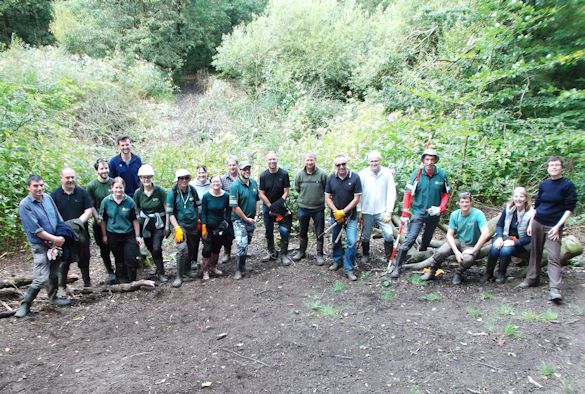
An Environment Agency Environment Day
Mike Norbury is a Knowledge Transfer Partnership (KTP) Associate in natural flood management, working with the University’s Department of Geography and Planning with WaterCo Consultants.
“I recently attended the launch of the All Party Parliamentary Water Group Water Innovation reception where a compelling case for collaboration to achieve water innovation was made.
That very same day, the National Environmental Research Council (NERC) hosted a Knowledge Exchange Network workshop where excellent growth in exchange partnerships between the universities, public and private sector was noted.
The need to collaborate in water is now more acute than ever. Freshwater is essential to our daily lives and the supply of clean water for business, domestic and agricultural use, along with adequate sanitation facilities is one of the most routine, yet challenging and contentious aspects of modern life.
The latest research on water suggests that global water demand will increase by 55% by 2050 and as a result the world could suffer a 40% shortfall in 15 years unless we dramatically change the way in which we use water and manage water resources (UNESCO, 2015).
Sitting alongside this human centric perspective, freshwaters are one of the planet’s most imperilled ecosystems, with fauna extinction occurring at 4% per decade and only 17% of UK rivers being in good ecological health.
In the UK, 1 in 6 UK properties are at flood risk, a harbinger of unhealthy river catchments were runoff rates are left unchecked.
In St. Helens, research from the KTP led to Groundworks Green Energisers building 4 hybrid-dams that attenuate 3,000 m3 of flood-flow – an incremental step to slowing the flow on Stanley Brook. The initial funding from Natural England was used to enhance the condition of Stanley Bank Meadow Site of Special Scientific Interest, but has bought about a multiplicity of other benefits, including water quality improvements, two Environment Agency environment days and study site for a Geography student.
The unprecedented river levels in Cumbria this weekend show that raising the walls alongside waterways and increasing the size of culverts is rarely the most sustainable solution.
Our proposal is to reverse engineer the catchment to see what would need to be done to hold water in the landscape to reduce the flow in settlements downstream, where the natural flood plain has been developed and properties enter the riparian zone. In this way, the natural approach can complement the engineered approach, through incremental attenuation, and corresponding reduction to river levels lapping at in-town defences downstream.”
Pedr Jones, Asset Strategy and Flood Risk at Waterco Consultants, commented:
“The knowledge transfer partnership with the University has allowed Waterco to grow its profile in flood risk management, form new relationships and glean new knowledge from partner organisations.
The partnership in natural flood management has bought environmental professionals together to meaningfully understand the dynamics of a catchment in detail and in turn create innovative, low cost and simple solutions to address the quickflow runoff at source.
By seeking to retain runoff where it starts to flow, natural approaches address the headwater flood generation mechanisms at field-scale, rather than the flood symptoms at the catchment outlet and floodplain.
Despite the initial difficulties of convincing the scientific, farming and regulatory communities of the power of nature in flood alleviation, it seems to be the case that only when end users have been involved in the scheme they gain confidence.
Particularly since holding water in the landscape is visibly demonstrable and easily explained, and hence, the approach often rapidly gains support from the community and land holders. Each natural flood management scheme is unique but successful schemes utilise the features, communities and issues in the localised catchment to provide common currency and themes that can be addressed.
Whilst the initiative in St. Helens has begun in earnest, there are many interventions required to alleviate the present flood risk and these are presently being analysed to ensure the best outcome for all is sought.”
Mike Norbury with David Hughes and Pedr Jones from Waterco Consultants in Parliament

